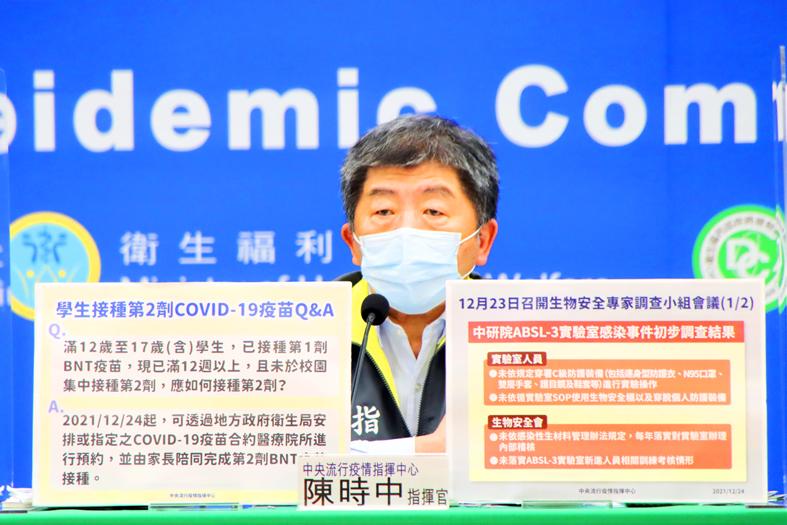Eleven imported COVID-19 cases previously reported by the Central Epidemic Command Center (CECC) have the Omicron variant of SARS-CoV-2, the center said yesterday.
The cases brought the country’s total number of Omicron cases to 27, of which 23 were confirmed over the past week, said Centers for Disease Control Deputy Director-General Philip Lo (羅一鈞), who is deputy head of the CECC’s medical response division.
The 27 cases are people who arrived from Brazil, Canada, Colombia, Eswatini, Germany, Nigeria, the UK and the US, Lo told a daily news briefing in Taipei.

Photo courtesy of the CECC
Arrivals from the US accounted for the largest number of cases at 12, he added.
All 27 people had been fully vaccinated with two doses of a COVID-19 vaccine, and had been on average infected with the disease 4.98 months after their second shot, he said.
Twelve received the Pfizer-BioNTech COVID-19 vaccine, five Moderna and four AstraZeneca, while six received doses from two different brands, he said.
While 13 of the cases did not show symptoms, 14 experienced only mild symptoms such as a cough or headache, Lo said.
The center also reported 20 new COVID-19 cases, all imported, and zero deaths.
The new cases involve 13 Taiwanese and seven foreigners, who entered Taiwan between Nov. 21 and Wednesday, from Canada, Indonesia, Japan, Lithuania, Malaysia, the Philippines, Thailand, the US and Vietnam, it said.
All except one were classified as breakthrough infections, it added.
As of Thursday, the nation’s first-dose COVID-19 vaccination rate was 79.72 percent, with the full vaccination rate at 66.5 percent.
Academia Sinica, Taiwan’s top research institution, was fined NT$150,000 for failing to implement safety procedures, including not wearing proper protective gear while conducting experiments, which led to a researcher at a laboratory handling COVID-19 to become infected with the virus earlier this month, Minister of Health and Welfare Chen Shih-chung (陳時中) said.
Separately, a person confirmed to have contracted COVID-19 visited Taipei’s Raohe Night Market (饒河夜市), prompting the tourist hot spot to close for disinfection, the Taipei Department of Health said yesterday, adding that the market would be closed until this afternoon.
The Taipei City Government said that the cycle threshold value of the person’s polymerase chain reaction test was 35, indicating they had been infected for a while and were most likely less infectious.
The department said the person was being classified as an imported case, who underwent testing to travel after being released from quarantine.

Beijing could eventually see a full amphibious invasion of Taiwan as the only "prudent" way to bring about unification, the US Department of Defense said in a newly released annual report to Congress. The Pentagon's "Annual Report to Congress: Military and Security Developments Involving the People's Republic of China 2025," was in many ways similar to last year’s report but reorganized the analysis of the options China has to take over Taiwan. Generally, according to the report, Chinese leaders view the People's Liberation Army's (PLA) capabilities for a Taiwan campaign as improving, but they remain uncertain about its readiness to successfully seize

Taiwan is getting a day off on Christmas for the first time in 25 years. The change comes after opposition parties passed a law earlier this year to add or restore five public holidays, including Constitution Day, which falls on today, Dec. 25. The day marks the 1947 adoption of the constitution of the Republic of China, as the government in Taipei is formally known. Back then the Chinese Nationalist Party (KMT) governed China from Nanjing. When the KMT, now an opposition party in Taiwan, passed the legislation on holidays, it said that they would help “commemorate the history of national development.” That

Taiwan has overtaken South Korea this year in per capita income for the first time in 23 years, IMF data showed. Per capita income is a nation’s GDP divided by the total population, used to compare average wealth levels across countries. Taiwan also beat Japan this year on per capita income, after surpassing it for the first time last year, US magazine Newsweek reported yesterday. Across Asia, Taiwan ranked fourth for per capita income at US$37,827 this year due to sustained economic growth, the report said. In the top three spots were Singapore, Macau and Hong Kong, it said. South

Snow fell on Yushan (Jade Mountain, 玉山) yesterday morning as a continental cold air mass sent temperatures below freezing on Taiwan’s tallest peak, the Central Weather Administration (CWA) said. Snowflakes were seen on Yushan’s north peak from 6:28am to 6:38am, but they did not fully cover the ground and no accumulation was recorded, the CWA said. As of 7:42am, the lowest temperature recorded across Taiwan was minus-5.5°C at Yushan’s Fengkou observatory and minus-4.7°C at the Yushan observatory, CWA data showed. On Hehuanshan (合歡山) in Nantou County, a low of 1.3°C was recorded at 6:39pm, when ice pellets fell at Songsyue Lodge (松雪樓), a